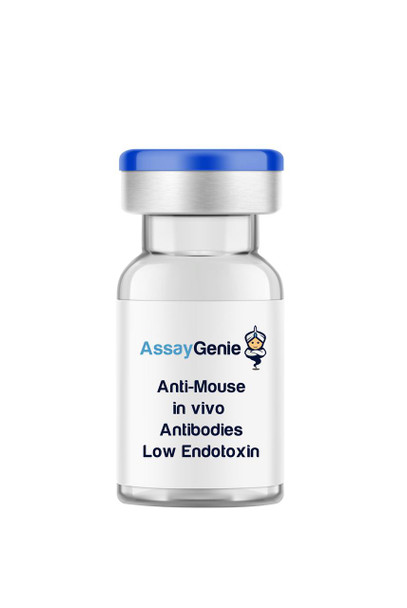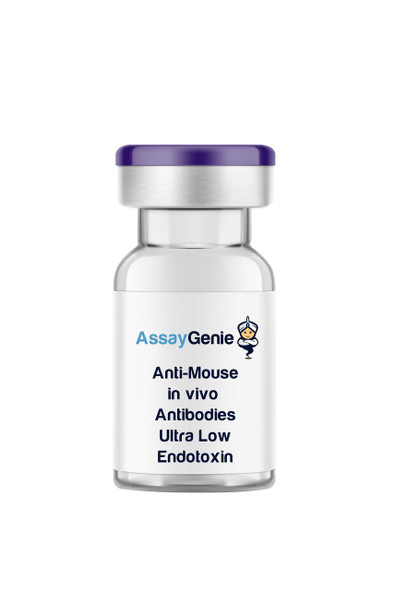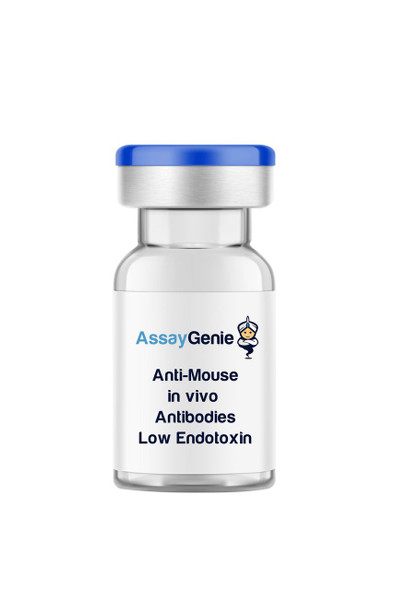Description
Anti-Mouse GM-CSF In Vivo Antibody - Low Endotoxin
Introducing the Anti-Mouse GM-CSF In Vivo Antibody - Low Endotoxin from Assay Genie, a highly specific monoclonal antibody designed for in vivo applications. This antibody targets the Granulocyte-Macrophage Colony-Stimulating Factor (GM-CSF), a critical cytokine in immune responses, making it ideal for research in immunology and related fields.
With a rat IgG1 kappa isotype, it ensures high purity and low endotoxin levels (<1.0 EU/mg), perfect for ELISA, flow cytometry, immunohistochemistry, and other assays. Available in various sizes, it is formulated in phosphate-buffered saline for optimal stability and efficacy. Enhance your research with this reliable and versatile antibody. GM-CSF is a cytokine that functions by promoting the differentiation and proliferation of granulocyte and macrophage progenitor cells from bone marrow, playing a significant role in enhancing the immune system's functionality. It is involved in various biological processes, including inflammation, autoimmunity, and hematopoiesis.
| Product Name: | Anti-Mouse GM-CSF In Vivo Antibody - Low Endotoxin |
| Product Code: | IVMB0076 |
| Size: | 1mg, 5mg, 25mg, 50mg, 100mg |
| Clone: | MP1-22E9 |
| Protein: | GM-CSF |
| Product Type: | Monoclonal Antibody |
| Synonyms: | CSF-2, MGI-1GM, Pluripoietin-Alpha |
| Isotype: | Rat IgG2a κ |
| Reactivity: | Mouse |
| Immunogen: | Yeast Derived Recombinant Mouse GM-CSF |
| Applications: | N, WB |
| Formulation: | This monoclonal antibody is aseptically packaged and formulated in 0.01 M phosphate buffered saline (150 mM NaCl) PBS pH 7.2 - 7.4 with no carrier protein, potassium, calcium or preservatives added. |
| Endotoxin Level: | < 1.0 EU/mg as determined by the LAL method |
| Purity: | ≥95% monomer by analytical SEC >95% by SDS Page |
| Preparation: | Functional grade preclinical antibodies are manufactured in an animal free facility using only In vitro protein free cell culture techniques and are purified by a multi-step process including the use of protein A or G to assure extremely low levels of endotoxins, leachable protein A or aggregates. |
| Storage and Handling: | Functional grade preclinical antibodies may be stored sterile as received at 2-8°C for up to one month. For longer term storage, aseptically aliquot in working volumes without diluting and store at -80°C. Avoid Repeated Freeze Thaw Cycles. |
| Applications: | N, WB |
| Reactivity: | Mouse |
| Host Species: | Rat |
| Specificity: | Clone MP1-22E9 recognizes an epitope on mouse GM-CSF. This antibody shows no cross-reactivity with rhGM-CSF. |
| Immunogen: | Yeast Derived Recombinant Mouse GM-CSF |
| Concentration: | ≥ 5.0 mg/ml |
| Endotoxin Level: | < 1.0 EU/mg as determined by the LAL method |
| Purity: | ≥95% monomer by analytical SEC >95% by SDS Page |
| Formulation: | This monoclonal antibody is aseptically packaged and formulated in 0.01 M phosphate buffered saline (150 mM NaCl) PBS pH 7.2 - 7.4 with no carrier protein, potassium, calcium or preservatives added. |
| Preparation: | Functional grade preclinical antibodies are manufactured in an animal free facility using only In vitro protein free cell culture techniques and are purified by a multi-step process including the use of protein A or G to assure extremely low levels of endotoxins, leachable protein A or aggregates. |
| Storage and Handling: | Functional grade preclinical antibodies may be stored sterile as received at 2-8°C for up to one month. For longer term storage, aseptically aliquot in working volumes without diluting and store at -80°C. Avoid Repeated Freeze Thaw Cycles. |
Granulocyte-Macrophage Colony Stimulating Factor is a 22 kD, pleiotropic cytokine that is a white blood cell growth factor. It controls the production and function of blood cells by stimulating stem cells to produce granulocytes and monocytes. GM-CSF differs from G-CSF in that it affects more cell types including macrophages and eosinophils. Moreover, GM-CSF is part of the immune/inflammatory cascade, a process crucial for fighting infection. Interestingly, GM-CSF expression may have pathological implications. Autocrine expression of GM-CSF in myeloid leukemia cells is suspected to play a role in neoplasia, the formation of a new and abnormal growth of tissue. Additionally, GM-CSF expression has also been documented in certain solid tumors. There have also been reports of GM-CSF in synovial fluid from patients with arthritis suggesting that GM-CSF may play a role in tissue damage associated with the inflammatory process. Blocking GM-CSF is thought to have therapeutic potential by reducing inflammation. Some drugs are currently being developed to block GM-CSF.
| Technical Datasheet: | View |
| Protein: | GM-CSF |
| Research Area: | Cell Biology, Stem Cell |







